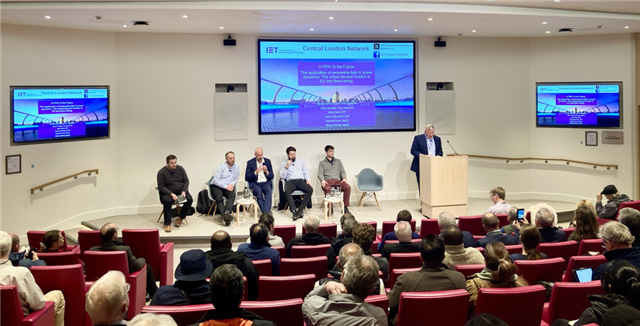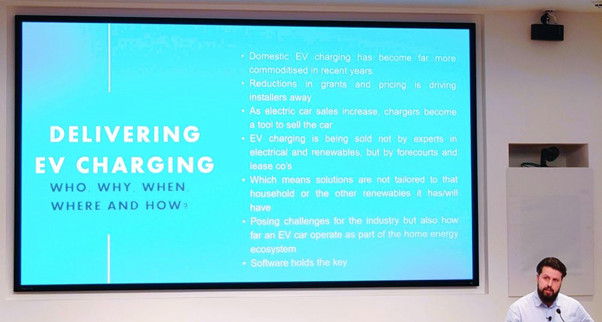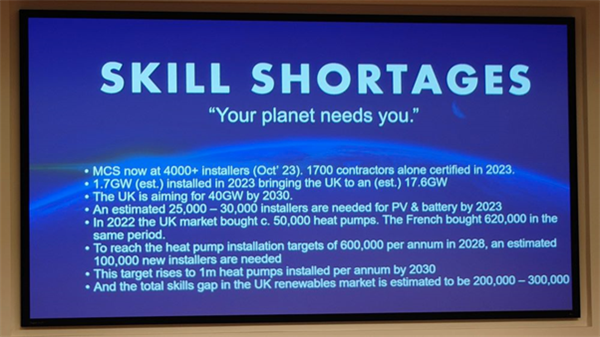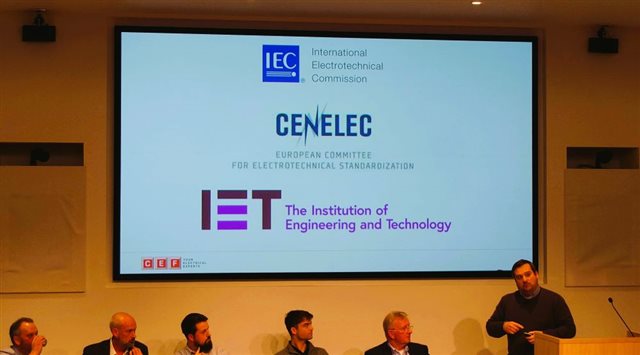It may have been a cold winters night outside, but a lot of light was shone by an ensemble cast on the challenges surrounding Energy Transition and the widespread adoption of renewable technologies.
The first of our guest speakers was George Ashley-Cound of Lightworks Ltd. George has had a long and varied career supplying lighting and power designs to the entertainment business and more than 50 of the world’s most luxurious hotels but he was rightly proud of one of his major successes, installing a solar farm at the Calabash Hotel in Grenada. The solar farm made a quick return on the investment and is now a major producer of electricity for the hotel. George thought this was a pathway to a new career, making Caribbean hotels self-sufficient. Alas, the global pandemic intervened, and George thought that he may have to retire but he asked himself the question “how can I retire from my hobby?”.

George has now found a way to power hotels and motorway service stations by sunshine, mobilizing ideas for a brighter future. But and there is always a but, George pointed out that of planning applications in the United Kingdom for ground mounted solar installations the success rate was 62.9%, with 14.9% of applications pending and 22.2% refused.
The Lightworks solution to this problem was to explore future uses of Agro Voltaics. George passed the speaking baton to his colleague Harry Hawkins (an architect by trade) who went on to explain the concept of Agro Voltaics, in effect dynamic greenhouses. The greenhouse can be fitted with moveable Photovoltaic [solar] panels, adjustable to suit the prevailing weather conditions, position of the sun in the sky and the nature of the plants underneath. Amongst other things the panels could be moved to provide shade to the crops beneath or positioned to provide maximum exposure (whilst still generating electricity).

Next up was Mike Gadd of City Electrical Factors (CEF). Mike highlighted some of the challenges in adopting renewals, the first being that most systems simply do not talk to each other through a mixture of age and the standards prevailing at the time of installation. This sometimes forces household consumers into a cycle of replacing perfectly good installations with new products, simply to keep up. A further problem impacting households is the way that charging of Electric Vehicles (EVs) is not tailored to that specific household leading to complaints about charging due to being misled / mis sold by car dealer.
In both cases Mike thought that software was key to overcoming these problems (See Note 1).


Mike touched on the skills shortages in the UK, where there are not enough technicians available to meet the demand to install Heat Pumps, PVs and Battery Storage systems. The National Grid is not up to scratch either, meaning that proposed installations are knocked back due a lack of capacity in the local infrastructure. This is a major problems and each occurrence knock confidence in renewables.
From Matt:E we had Mathew Hunt and Richard Winter who styled themselves the Ant & Dec of 3 Phase supply Protective Devices! Their Guardian product is not only suitable for EV charging installations but can be deployed to whole buildings on a floor-by-floor basis to provide a level of protection and detection that a traditional Circuit Breaker or Residual Current Device would not. An innovative cloud-based interface provides monitoring and alerts in event of a fault.
Our final speaker was Darren Sandiforth, Head of Technical Solutions at CEF. Darren’s forte is standards and he explained how they are developed and flowed down from the IEC to the IET via CENELEC. There is constant change, and Darren made a plea to the audience to look at the BSI website and contribute to the development and update of standards.

The lecture concluded with a roundup where the consensus was that there is no silver bullet for Energy Transition. There followed a Q&A session where the questions ranged from replacing roof tiles with solar panels, the challenges of installing renewables for those that rent a property and the ability of local authorities (councils) to provide accurate and up to date advice.
The lecture can be viewed on IET TV here: https://tv.theiet.org/?videoid=17315
Overall, another fascinating lecture on a subject that will touch us all. It was refreshing to see the pitfalls and challenges discussed in an open and honest manner, but equally pleasing to see some real innovation in action.
Note 1: Software for integrating renewal devices in the home was discussed in the previous lecture The Benefits of Digitalisation for Energy Transition.